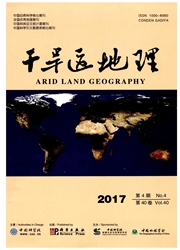

 中文摘要:
中文摘要:
脆弱性研究属于区域可持续发展研究领域的科学问题,是未来我国经济社会发展迫切需要的基础性科学问题,是提供一种预警性、反馈性和战略性科学依据的研究课题。将脆弱性应用于区域发展人地系统研究中,阐述农业地区人地系统脆弱性特征,以陕西省澄城县为例,选取1991-2011年共16个评价样本,对其人地系统压力、敏感性、恢复力、脆弱性演变进行评价,提出了发展模式。结果表明:澄城县脆弱性指数下降较快,从1991年的6.89降至2011年的0.15,主要原因是该地区长期以农业发展为主要发展方向,以及国家采取的惠农政策有力地降低了该地区脆弱性;澄城县依靠农业生态资源优势发展生态经济,宜采取可持续农业驱动型发展模式,在稳定粮食总产量的基础上,发展生态农业,加强科技投入推进农业产业化发展、规模化运作,提升农业竞争力的同时,规范化推进劳务输出等,以建立农民增收的多元长效机制。
 英文摘要:
英文摘要:
Vulnerability research belongs to the academic problem related to the research sphere of regional sustainable development, but also is the science problem of urgently necessary research for China' s future economic and social development in order to provide an early warning, feedback and strategic scientific basis. Based on the man-land system vulnerability in regional development, this paper attempts to study the characteristics of man-land system vulnerability in agriculture areas. Taking Chengcheng County, Shaanxi Province, China as an example and selecting its 16 evaluation samples during the period from 1991 to 2011, man-land system pressure, sensitivity, restoring force and vulnerability evolution were evaluated and put forward its development models. The results show that the vulnerability index went down quickly, from 6.89 in 1991 to 0. 15 in 2011. The main reasons are listed as follows: this county toke agriculture development as main development direction over a long period of time and the agriculture-supporting policy taken by local government decreased this region' s vulnerability strongly. Chengcheng County should take following measures to develop economy: to develop ecological economy relying on the advantages of agro-ecological resources; to take the driving models of sustainably developing agriculture ; to develop ecological agriculture on the basis of stabilizing grain total output, to strength scientific and technical input forcing agriculture development; to apply large-scale styles promoting agriculture competition and to advance standardization of labour export, in order to set up long effect and multiple elements' mechanism for increasing farmer' s income.
 同期刊论文项目
同期刊论文项目
 同项目期刊论文
同项目期刊论文
 期刊信息
期刊信息
